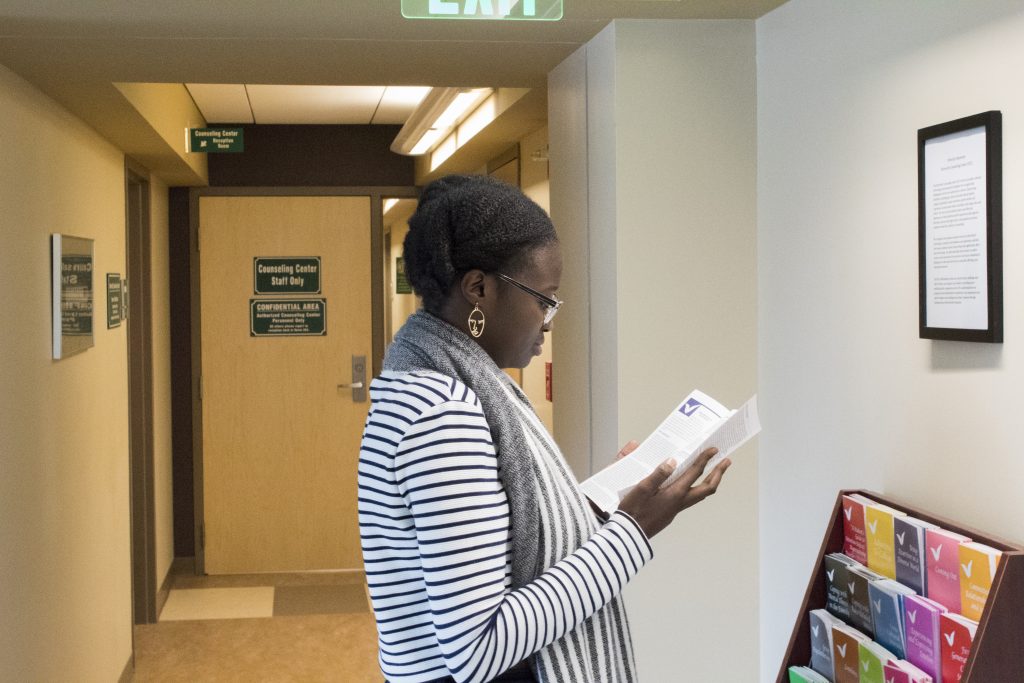
On a campus with more than 13,000 undergraduate students, Binghamton University currently has 15 counselors working at the University Counseling Center (UCC). Since fall 2017, the UCC has added four new counseling positions, approximately 30 percent of the current counseling staff.
According to Johann Fiore-Conte, the head of counseling and student support committee and assistant vice president for health and wellness, the UCC has been working on expanding its services over the past two years in response to students’ concerns about the office’s ability to adequately provide mental health services on campus. The expansion was hastened by the University’s safety initiative, which was implemented by the University administration following the murders of two students last semester and established the counseling and student support committee. Following the murders, BU administration pledged to fund increased mental health services on campus.
Along with staff increases, the UCC also hired three new counselors with experience in multicultural counseling and counseling for the LGBTQ+ community for the 2018-19 academic year. According to Noel Feik, director of health and counseling at the UCC, the center is aiming to diversify staff and has created a liaison with the Multicultural Resource Center and the Student Association’s vice president for multicultural affairs office.
“The UCC has been working to diversify staff and to be responsive to student concerns about diversity,” Feik wrote. “Students have expressed support for the new positions and initiatives, especially students who are aware of the recent increase in demand for services. There has also been support and appreciation for the addition of staff with multicultural experience and interest.”
In addition to employing full-time, professional counselors, the UCC traditionally hires interns, usually students working toward a master’s degree in social work, to help provide mental health services for students. Although the number of interns hired has not changed over the past several years, the UCC has implemented mental health services and initiatives not related to an increase in staff, including expanding medical residency training programs at Decker Student Health Services Center to increase access to psychiatry appointments and expanding after-hours phone counseling.
Other offices, such as the Health Promotion and Prevention Services, have been adding more mental health resources to fill in the gaps in the University’s current mental health services. According to Kimberly Peabody, the director of the Health Promotion and Prevention Services, which provides programs like 20:1 Sexual Assault Prevention Program and REACH, the office has expanded its role of the mental health coordinator position.
“Mental health is such an important part of lifelong success for all members of the Binghamton University community,” Peabody wrote in an email. “We felt it was necessary to devote the resources and make this a full time priority.”
The University also offers resources outside of the UCC, including the SUNY Tele-Counseling/Tele-Psychiatry pilot program, which allows students to video chat with professional counselors and emergency services such as the High Hopes Helpline, a help hotline.
Despite the increased resources, the number of students seeking mental health assistance is increasing. During the 2017-18 academic year, 1,905 students visited the UCC, and according to Mark Rice, the clinical director of the UCC, the number of students that visit the center increases every year.
“The increase is a combination of increased enrollment and increased percentage of the student body using the service,” Rice wrote in an email. “While we can’t know precisely the reason for the increase in the percentage of students seeking service, it may be due to outreach and education efforts to increase awareness and reduce stigma.”
The increases have led to a waitlist for help. During busy periods of the semester, waitlists often form for UCC appointments for students not already scheduled with counselors. Currently, students seeking new appointments and counselors are being waitlisted. Emergency counseling is still available to these students, but they will have to wait for ongoing appointments.
Students who do have ongoing, individual counseling sessions at the UCC are limited to three semesters of ongoing help, and cannot see their counselor more often than once every two weeks, except for emergency counseling. The UCC uses a brief therapy model, which aims to help students reach personal goals and provide solution-based care. But students who require long-term therapy cannot find it on campus. Usually, the UCC will hold an initial meeting with these students before referring them to a community provider.
Abby Kress, a sophomore majoring in biology, recently started going to the UCC this semester and said she wished they had more availability.
“I personally wish they had more meeting times, like every week, but I understand that they have to deal with a lot of kids in a day,” Kress said. “I was waitlisted for a few weeks because they didn’t have any openings and they were trying to find someone who fit my schedule.”
Nevertheless, Kress said free counseling on campus is crucial, and the UCC is still an important service, even if it’s not perfect.
“It’s nice that it is free and on campus,” Kress said. “It’s definitely a good resource for anyone to use.”


